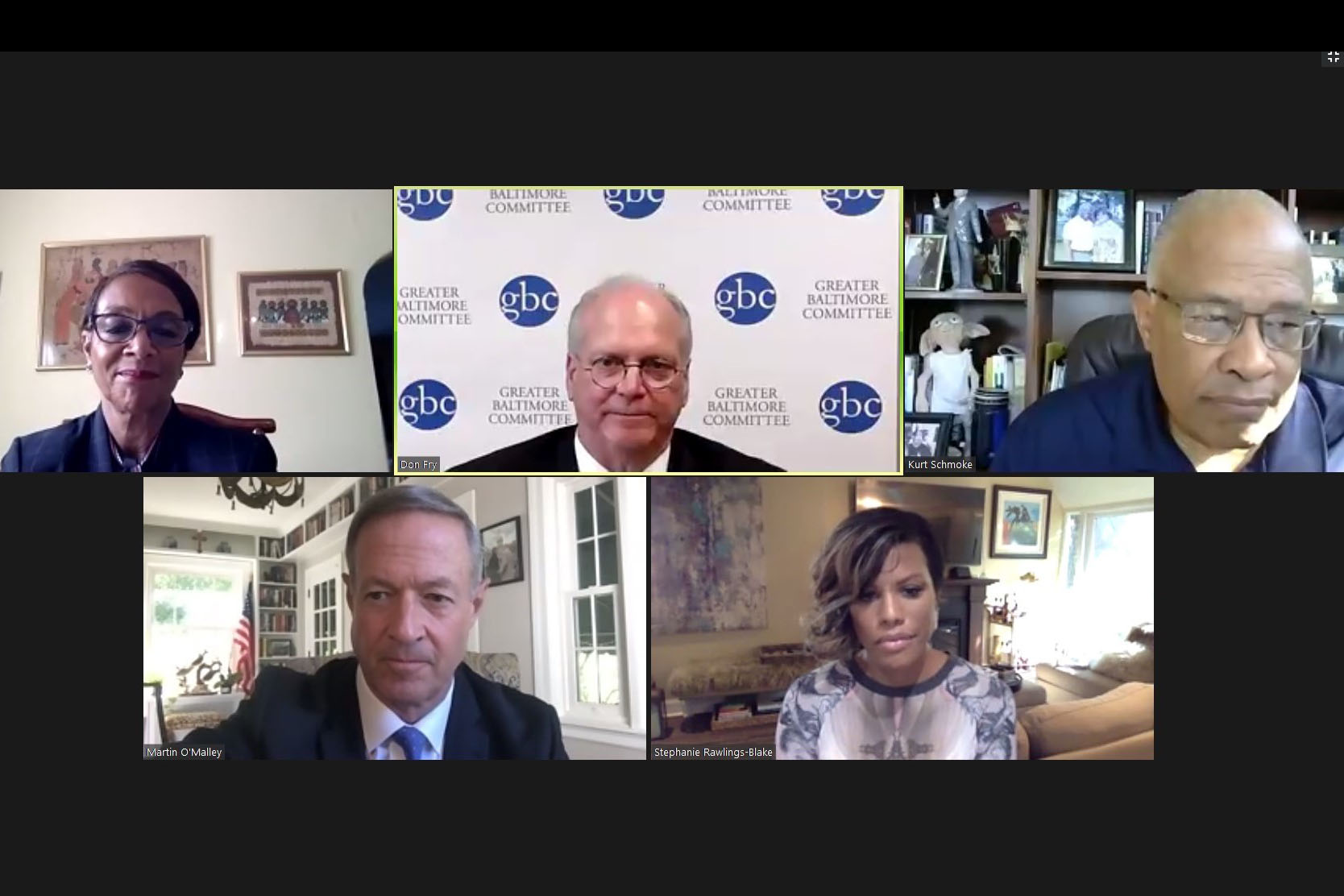Former Baltimore Mayors Oppose Proposed City Government Reforms

The Democratic nominee for Baltimore mayor wants to cut back on power of the office he is likely to assume ― a stance that some of the city’s former mayors say is akin to fighting with one hand tied.
Former Democratic mayors Martin J. O’Malley, Sheila A. Dixon, Stephanie Rawlings-Blake and Kurt L. Schmoke slammed proposals to reduce the size of the city’s Board of Estimates and introduce a city administrator during an online discussion with the Greater Baltimore Committee this week.
Those cuts to mayoral power, championed by current City Council President and Democratic nominee for mayor, Brandon M. Scott, would cripple the city’s governmental power in the midst of a pandemic and recession, Rawlings-Blake said.
“We’re in a fight for our lives in the recession and our response to the pandemic,” she said. “The things that have been suggested … would be akin to being in a prize fight, jumping in the ring and then tying one arm behind your back.”
Dixon, who Scott narrowly defeated in the city’s Democratic primary, said cutting back the Board of Estimates, would lead to politicization and slow down the city’s spending process. Scott plans to reduce the size of the spending body to include “only elected officials that must answer to voters.”
Scott has argued that a city administrator position would “professionalize” city government, and said an administrator would keep politics out of the regular operation of the city. The Baltimore City Council previously overrode a veto on the administrator position by lame-duck mayor Bernard C. “Jack” Young, paving the way for voters to decide on the position during the upcoming election.
O’Malley and other former mayors argue that Baltimore’s strong mayoral system, where the chief executive is given wide discretion over the operation of the city, puts more power into the hands of voters rather than bureaucrats.
“It does put a lot of responsibility and executive power into the hands of the person that we directly elect to be our mayor,” O’Malley said. “We should not lightly throw out the strong mayor system we have. I believe it’s superior to others, provided the mayor does the job.”
Scott, on the other hand, has pointed to corruption and recent mayoral resignations in urging reforms. Dixon resigned a decade ago after a lengthy corruption investigation. More recently, former mayor Catherine E. Pugh (D) was sent to federal prison over a fraud and tax evasion scandal.
Schmoke said the people in government, rather than the structure of government, should take priority for Baltimore’s mayors.
“I keep urging the candidates, please focus on the people in government, not the structure of government in terms of really serving our citizens and dealing with their needs,” he said. “I don’t believe it’s just the structure that creates inefficiencies or corruption.”
Whether to establish a city administrator will ultimately be up to voters: After the city council overrode Young’s veto, the charter amendment was placed on the November ballot for consideration.
O’Malley mourns the Red Line
Although half a decade has passed since Gov. Lawrence J. Hogan Jr. (R) snuffed out Baltimore’s long-sought Red Line, O’Malley’s anger over the project’s demise is still fresh.
“It was a damn shame, to put it mildly,” O’Malley said of Hogan’s decision to kill the Red Line.
Hogan put a permanent halt to the Red Line shortly after taking office, calling it a “wasteful boondoggle.” The 14-mile railway would’ve connected Woodlawn to Bayview, and advocates said it could have transformed some of the city’s struggling neighborhoods.
O’Malley charged that Hogan diverted money from the Red Line toward interchanges near properties that he owned, and accused the current governor of making himself a multi-millionaire while in office. Hogan continued to invest in real estate properties after taking office, his previous ethics disclosure showed.
O’Malley previously said Hogan’s decision to end the Red Line project was out of animosity toward low-income residents of the city.
“I think the rationale was that Larry Hogan believes that the state shouldn’t invest in transit in cities,” O’Malley said in February. “He thinks that public transportation is a free ride for those people who live in Baltimore City. And it’s good politics for Larry Hogan to speak in coded terms about ‘those people’ in Baltimore.”




 Creative Commons Attribution
Creative Commons Attribution